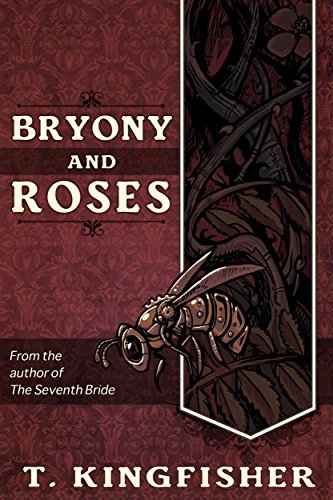Bryony and Roses
 The first thing I found out reading this is that I should read Robin McKinley’s Rose Daughter. I think I remember a friend enthusing about it at the time, but that recommendation has been lost to mists of time.
The first thing I found out reading this is that I should read Robin McKinley’s Rose Daughter. I think I remember a friend enthusing about it at the time, but that recommendation has been lost to mists of time.
Ursula Vernon’s retelling of Beauty and the Beast takes from a number of sources. Not least of all, her own sensibilities. We have a practical, gardening, heroine. When she come across a mansion where none should be, with no one around, and immaculately kept, she has questions. (“…it occurred to her that boxwoods needed pruning and unless the abandoned convent still kept a gardening staff, the neat cubical hedge would be a thicket in two seasons.”)
Disney’s version shows a bit here. Bryony and her horse are lost in a severe snowstorm when she stumbles across an impossible road to a mansion that shouldn’t be there with self-pruning topiary. The Beast’s description is a bit vague, but would fit Disney’s version just fine. And Vernon answers the common complaint of that movie (spoiler!) by not having the Beast turn back to human.
There are no enchanted servants. The mansion itself takes care of everything. Somehow. Working into that, and the fact that the Beast is obviously constrained from talking about certain things provides the bulk of the tension of the novel. The main outlines are familiar, but just what has the Beast trapped as much as Bryony is the question.
The main new element is the fact that Bryony (which, by the way is not only a type of climbing, flowering, plant, but as a name comes from Latin “to sprout”), is a gardener, who like Vernon, has little patience for roses. And of course, there is a rose motif all over in this book (starting with the first view of the mansion, “a high stone wall, inset with a pair iron gates with twining wrought-iron roses.”).
Past that, do remember this is a fairly short novel. It’s a very good one, but don’t expect too many surprises of a well-known tale, though, being a T. Kingfisher novel, a bit of turn towards horror shouldn’t be a big surprise either (thankfully, the main horrific elements are quite limited).

Discussion ¬